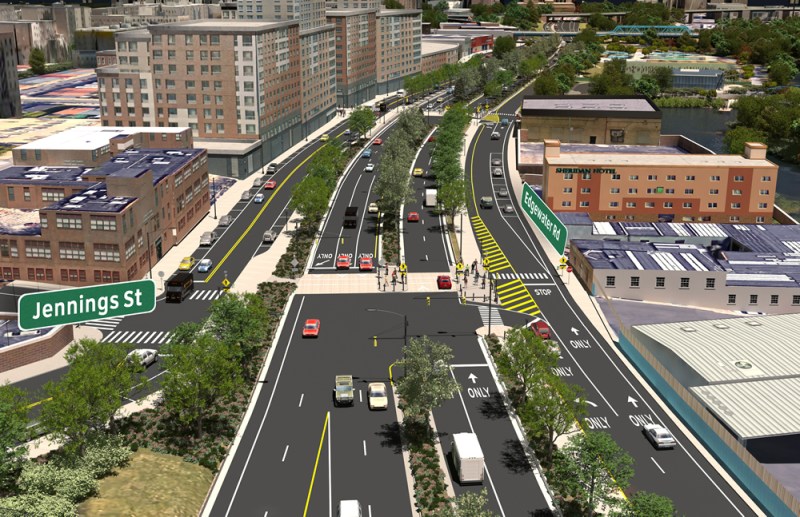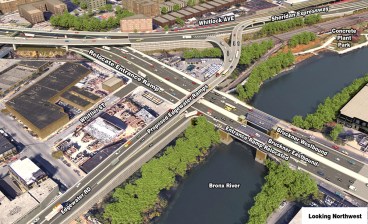Cuomo’s Sheridan Expressway Plan Is Not What the South Bronx Asked For
The option that the state DOT is pushing for the Sheridan project "bypassed everything" that local advocates wanted from the highway removal.

South Bronx advocates are raising the alarm about the Cuomo administration’s plans for the Sheridan Expressway, saying the state DOT is rushing ahead with a project that ignores years of advocacy for safer neighborhood streets with less truck traffic.
The Sheridan project, which also involves reconfiguring portions of the Bruckner Expressway, is supposed to give South Bronx residents better access to the Bronx River and get truck traffic off neighborhood streets. Instead, the state DOT is planning to maintain the Sheridan as a highway-like truck route and place a new highway ramp along the Bronx River waterfront and over parkland and local streets. The project is on the fast track, warn local environmental justice groups, who want more time to assess and shape the plan.
The DOT is approaching the Sheridan project as two components. One piece, converting the Sheridan from a limited-access highway into a surface street, is relatively simple and inexpensive. It’s currently budgeted at $97 million.
The other piece, known as the “Hunts Point Interstate Access Improvement Project,” involves reconfiguring a stretch of the Bruckner Expressway so ramps connect directly to the massive Hunts Point Market food distribution center. That is where the bulk of the work and expense lie, with DOT estimating the cost at $1.7 billion or higher.
Advocates have flagged problems with both components. The DOT’s design for the Sheridan piece is still very much like a highway, maintaining the same number of travel lanes as the current road.
Meanwhile, the state’s preferred option for the Bruckner won’t deliver the reductions in truck traffic on surface streets that neighborhood residents want. Under consideration are two proposals, one that would build new ramps from the Bruckner Expressway onto Leggett Avenue and from the Bruckner-Sheridan interchange via Edgewater Road, and another that would place the ramps at Leggett Avenue and Oak Point Avenue [PDF].

The $1.7 billion Edgewater ramp proposal would essentially put a new elevated highway segment over Concrete Plant Park, connecting to Edgewater Road, which runs directly adjacent to the river and Hunts Point Riverside Park. The Oak Point Avenue plan, on the other hand, steers trucks away from the riverfront entirely. But it costs $2.6 billion (if you believe the state DOT estimates), largely because it would involve a full reconstruction and widening of the Bruckner from the Bronx River to the Bronx River Parkway.
A 2013 city study recommended the Oak Point Avenue option, saying it would lead more truck traffic to stay on the Bruckner and avoid the Sheridan surface road. What’s more, the city’s recommendations did not involve the expensive Bruckner widening in the state DOT’s proposal. The cost estimate would likely be much lower without that.
While the Cuomo administration is ostensibly considering both options, the Edgewater Road version, which the DOT first put forward in 2003, is clearly the state’s preference. When Cuomo announced the project in March, the state treated the Edgewater option as a foregone conclusion.
After almost two decades of campaigning to remove the Sheridan, advocates are not about to accept what the state DOT is offering. “We are disappointed in that the plan omitted everything the community had inputted to the plan,” said Maria Torres, executive director of the Point CDC, which has advocated for the Sheridan teardown. “People spent a lot of time, many years, coming up with other alternatives for the Sheridan and it felt like this plan went backwards, it went back to the first scheme and bypassed everything the community has said.”
State DOT now appears to be in a hurry to get the project done, aiming to complete its initial assessment of the two concepts by September. The first and only public scoping meeting, held on Tuesday, was announced one week earlier, leaving little time for South Bronx environmental justice groups to organize for it. During the event itself, there was no public discussion or question-and-answer session. Attendees were invited to submit their comments in writing or dictate them to a stenographer.
The South Bronx River Watershed Alliance, the coalition of local environmental justice groups that pushed for the Sheridan’s decommission for decades, wants more time — at least a four-month comment period.
For South Bronx residents, the future of their neighborhoods is at stake. Naseem Haamid, a leader at SBRWA coalition member Youth Ministries for Peace and Justice, graduated earlier this month from Fannie Lou Hamer Freedom High School, at West Farms Road and Jennings Street just next to the Sheridan. To get to school each day, Haamid had to cross the Bronx River and the expressway from his home on Bronx River Avenue in Soundview.
“I would walk to school, I would see all the trucks coming off the Sheridan Expressway into local streets,” he said. “I [found] myself walking to school holding my breath or putting my shirt over my nose because the smell is terrible.”
You can submit comments on the Hunts Point access proposals via email to HuntsPoint@dot.ny.gov, or by snail mail to the NYSDOT Hunts Point Project Team at 47-40 21st Street, Long Island City, NY 11101.
